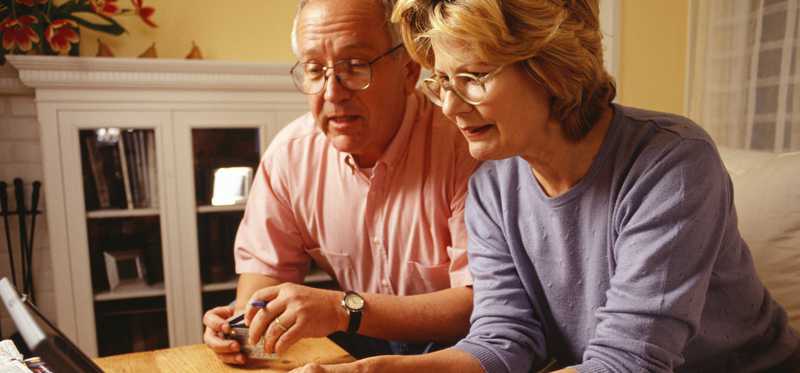10 Ways to Know You're Ready to Retire

10 Ways to Know You're Ready to Retire
Ready for retirement, emotionally and financially
Retirement is one of life's major milestones, and it's not something to embark on lightly. There's the financial side of being ready to retire -- whether you can afford to retire and if your savings will last, for example. And then there's the emotional component -- as in, will you get bored with an extra 40 hours of free time on your hands?
You might feel ready, but a deeper dive could indicate you have some work to do. Read on for 10 benchmarks that'll help you explore your retirement readiness, financially and emotionally.
5 Stocks Under $49
Presented by Motley Fool Stock Advisor
We hear it over and over from investors, "I wish I had bought Amazon or Netflix when they were first recommended by The Motley Fool. I’d be sitting on a gold mine!" It's true, but we think these 5 other stocks are screaming buys. And you can buy them now for less than $49 a share! Click here to learn how you can grab a copy of "5 Growth Stocks Under $49" for FREE for a limited time only.
Previous
Next

1. You have saved at least 10 times your annual salary
To avoid a lifestyle downgrade in retirement, most people need savings equal to at least 10 times their annual salary.
Here's where that number comes from. Once you shift into retirement, your living expenses often go down. You won't have retirement contributions, payroll taxes, or work-related expenses, for example. Thus, many financial planners estimate you'll need 80% of your working income to pay the bills in retirement.
Of that 80%, Social Security should provide about half, or 40% of your salary -- as long as you don't claim early. The other 40% will come from your savings. Assuming you withdraw 4% annually, a savings balance of 10 times your annual salary would produce 40% of your current income.
Previous
Next

2. You have estimated your Social Security benefit
You can estimate your Social Security benefit easily by creating an account at my Social Security. You'll want to do this well before you retire. It's good information to know, and it should validate your savings target.
Ideally, your benefit estimate will be what you expected. But you might find your Social Security benefit will replace only 30% of your annual income, for example. This can happen if you claim early or if you have a higher-than-average salary. In that case, you may want to increase your savings goal so you can pull more income from your retirement account.
Previous
Next

3. You have a plan for healthcare
You don't want to shift into retirement without health insurance. If you are 65, Medicare may be the easy answer. If you are younger than 65, you'll need another type of coverage.
Your options for health insurance outside of Medicare include a private plan from the healthcare marketplace, COBRA coverage, or an employer plan offered to retirees. The healthcare marketplace is often the best option, as the plans can be less expensive than COBRA coverage.
The healthcare marketplace has open enrollment once annually. You do qualify for a special enrollment period if you lose your insurance when you retire. However, you do not qualify for special enrollment if you opt for COBRA coverage at retirement and then later drop that coverage voluntarily.
ALSO READ: How Much Will Health Insurance Cost in Retirement?
Previous
Next

4. You're comfortable with the risk in your portfolio
In retirement, you'll be more sensitive to volatility in your portfolio. Without the regular contributions from your paycheck, there's no deposit activity to mask the dips in your balance. Plus, you may keep a closer watch on that balance -- since it's a major source of your livelihood.
You can spare yourself some stress by reviewing your portfolio risk and adjusting before you retire. You might not need any changes. But a popular strategy for retirees is to shift to a greater percentage of less volatile assets, like fixed income funds.
Previous
Next

5. You've paid off your credit cards
Credit card debt is a budget killer. If you make the minimum payments, those accounts keep generating expenses -- interest charges that provide zero value to your quality of life. Once you're on a fixed income, those ongoing charges will feel even more wasteful. Without a paycheck, annual raises, and bonuses, it will be more difficult to pay down those accounts, too.
Think of it this way. If you've paid off your high-rate debts, you'll have a bigger budget for enjoying your work-free life -- which is what retirement's all about, right?
5 Stocks Under $49
Presented by Motley Fool Stock Advisor
We hear it over and over from investors, "I wish I had bought Amazon or Netflix when they were first recommended by The Motley Fool. I’d be sitting on a gold mine!" It's true, but we think these 5 other stocks are screaming buys. And you can buy them now for less than $49 a share! Click here to learn how you can grab a copy of "5 Growth Stocks Under $49" for FREE for a limited time only.
Previous
Next

6. You have cash savings
You should have an emergency fund while you're working. But you must have an emergency cash fund once you retire.
Without an emergency fund, you'll pay for unexpected expenses with a credit card, extra distributions from your retirement account, or some type of loan. Each of those has serious disadvantages. As noted already, debt is hard to pay off in retirement. And unexpected retirement distributions can threaten your long-term solvency.
Experts recommend having enough cash on hand to fund three to six months of living expenses. You may need more or less than that, depending on how tight your monthly budget is and how you're invested. If you're invested aggressively, for example, you might need more cash. The extra savings could help you reduce asset liquidations (and realized losses) during market downturns.
Previous
Next

7. You have a budget
Even if you're not the type to budget living expenses, you'll want to do it before you retire. Making a budget is the best way to get in touch with how you spend money.
Without a budget, you risk underestimating the income you need to cover your living expenses. To correct that issue once you're already retired, you'd have to downgrade your lifestyle or raise your retirement distributions. A lifestyle downgrade is not ideal. But then, raising your retirement distributions could affect your long-term solvency.
Take a stab at building a retirement budget now, then practice living into that budget. Doing so while you're still working gives you some flexibility to adjust your plan if you need to.
ALSO READ: Retiring in 2022? 4 Steps for Setting up Your Budget
Previous
Next

8. You aren't motivated at work
Work should provide structure to your day, as well as social interaction and a sense of fulfillment. But if you've been daydreaming in meetings or losing interest in tasks you used to love, it may be time for a change.
It's also useful to identify the cause of any declining motivation. Maybe you're eager to spend more time on your hobbies, for example. Or, maybe you've had the same set of responsibilities for too long.
Whatever answer you land on, brainstorm how to remedy the issue in retirement. The answer might be simple -- such as joining a golf club. Or, you might decide to work part-time in retirement, or volunteer for a role that aligns with your interests.
Previous
Next

9. Your friends are retired
Being the first person in your social circle to retire can be isolating. Even though your weekdays are free, you'd have to plan group activities on evenings and weekends. Unless you have a solo hobby you love, you may get bored pretty quickly. Boredom, left unchecked, can easily lead to depression and anxiety.
On the other hand, if you're the last of your friends who's still working, you have a social circle waiting for you. Probably your retired friends are already telling you how they're spending their time. If not, ask. Make sure you can picture yourself stepping into those activities.
Previous
Next

10. You have a bucket list
A social calendar in retirement can keep you busy day to day, but you may enjoy having longer-term goals also. That's where your bucket list comes into play. Consider the bucket list a replacement for work-related goals like getting a promotion or reaching a salary milestone.
Prioritizing, planning, and budgeting your bucket list items engages your creativity and problem-solving skills. It also forces you to identify the kind of life you want in retirement. And then, there's the satisfaction you gain each time you check something off that list.
If you don't have a bucket list today, make one. You'll likely learn a lot about your retirement readiness in the process.
5 Stocks Under $49
Presented by Motley Fool Stock Advisor
We hear it over and over from investors, "I wish I had bought Amazon or Netflix when they were first recommended by The Motley Fool. I’d be sitting on a gold mine!" It's true, but we think these 5 other stocks are screaming buys. And you can buy them now for less than $49 a share! Click here to learn how you can grab a copy of "5 Growth Stocks Under $49" for FREE for a limited time only.
Previous
Next

Retirement just ahead
At the end of the day, you're the best judge of your retirement preparedness. You may not check all 10 readiness boxes right now and that's OK.
The good news is, the boxes you don't check should point you to next steps -- or indicate potential pitfalls. For example, you can estimate your Social Security benefit in less than five minutes. Or, if none of your friends are retired, you know you need to brainstorm hobbies that don't require a group.
Remember this as you evaluate your retirement readiness: The more prepared you feel to retire, the more you can relax and enjoy your new, work-free lifestyle.
The Motley Fool has a disclosure policy.
Previous
Next
Invest Smarter with The Motley Fool
Join Over Half a Million Premium Members Receiving…
- New Stock Picks Each Month
- Detailed Analysis of Companies
- Model Portfolios
- Live Streaming During Market Hours
- And Much More
READ MORE
HOW THE MOTLEY FOOL CAN HELP YOU
-
Premium Investing Guidance
Market beating stocks from our award-winning service
-
The Daily Upside Newsletter
Investment news and high-quality insights delivered straight to your inbox
-
Get Started Investing
You can do it. Successful investing in just a few steps
-
Win at Retirement
Secrets and strategies for the post-work life you want.
-
Find a Broker
Find the right brokerage account for you.
-
Listen to our Podcasts
Hear our experts take on stocks, the market, and how to invest.
Premium Investing Services
Invest better with The Motley Fool. Get stock recommendations, portfolio guidance, and more from The Motley Fool's premium services.